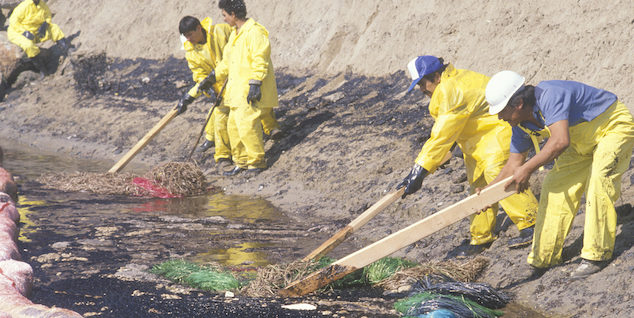Opinion
Huntington Beach oil spill renews focus on conservation
 Workers clean up an oil spill at Huntington Beach. (Photo: Joseph Sohm, via Shutterstock)
Workers clean up an oil spill at Huntington Beach. (Photo: Joseph Sohm, via Shutterstock)As an avid surfer and freediver, I have experienced the wonders of our coastline and have had the privilege to see up close what many never get to encounter underwater. The recent oil spill in Huntington Beach should be a wakeup call to all Californians that we need to pay attention to what’s happening to our coast as we address the climate crisis.
In my lifetime, I have seen the precious kelp forests off of our coast diminish due to the warming climate and waters.
The first species that I saw decrease were the starfish. Over the past 20 years, I have seen a major decline in biodiversity around our reefs and underwater forests. The ‘sequoias of the sea’ absorb carbon from the atmosphere and are home to over 1,000 species of animals and plants.
Gov. Gavin Newsom has approved 150 offshore drilling permits in state waters since January, 2019.
People get upset when our great ancient trees are threatened by fire and drought, but many folks don’t know about the fragile ecosystems in the waters off our coast. Kelp forest ecosystems have become imperiled, and seals and sea lions, who depend on that kelp, are part of the iconic image of our coastline.
Oil drilling off the coast poses a direct and unnecessary threat to efforts to save our kelp forests and ultimately to save our planet from the disastrous impacts of climate change.
Gov. Gavin Newsom has approved 150 offshore drilling permits in state waters since January, 2019. Five of those permits were for new wells. In September of 2020, Gov. Newsom stood in an eerie, ash filled forest surveying the damage from one of the deadliest forest fires in our state’s history, and declared that we must accelerate our goals for reducing greenhouse gases.
Statements about lowering carbon output and transitioning to sustainable sources of energy are undermined by the continued permitting of oil wells both on and offshore.
We need to preserve our coast because healthy coastal waters help make our environment more habitable and support stronger public health. California has a unique responsibility to steward these ecosystems as our contribution to climatic stability. The tourism, fishing, recreation, and even agricultural industries all depend on a healthy ocean and coastal ecosystem.
Desalinated water is the most expensive water, and it’s the most damaging option for the ocean.
Our state’s relatively mild climate and weather enables farmers to grow crops year round, but predictable weather patterns that farmers count on are influenced by the health of the Pacific Ocean.
Recently, Gov. Newsom applied water restrictions, urging all Californians to cut water usage by 15 percent. As we grapple with drier winters, desalination has been offered as a solution to our state’s water woes. But this is not a sustainable solution for addressing the growing water crisis.
Desalinated water is the most expensive water, and it’s the most damaging option for the ocean, producing a toxic stew of concentrated brine that spews back into the sea, killing fish and other sea life.
You cannot be pro-ocean if you are pro-desalination.
In Huntington Beach, Brookfield-Poseidon has plans to build a billion and a half dollar desalination plant just as soon as it can clear permitting that has spanned two decades.
The asset-management and water giant has a hearing before the California Coastal Commission coming this winter for a key permit. We don’t need to add a polluting plant that would operate off of fossil fuel-generated energy to the ecological devastation from the recent oil spill when we have solutions to help improve our coastal waters and to shore up our freshwater sources.
We can advance a more rapid transition away from fossil fuels and a quicker adoption of solar and wind power. Policymakers can support more conservation incentives, water recycling, and water capture, so that our communities have alternatives to costly and polluting desalination plants to safeguard our public health and our marine ecosystems.
We can plant eco-friendly crops and environmentally regenerative landscaping to lessen the downstream impacts to our wetlands and coast. And we should work in consultation with tribal communities, the original stewards of our coastal lands and waters, about how to best protect these resources. Our $44 billion coastal economy depends upon our efforts to preserve the dynamic and ecologically diverse Pacific waters.
The Huntington Beach oil spill is a warning for California leaders. We cannot delay the move toward clean energy, and we should not manage our water needs with unsustainable desalination that harms our coast.
—
Editor’s Note: Benito Olamendi is a professional permaculture designer and a surfer and freediver who resides in the ancestral lands of the Acjachemen Nation, currently known as San Clemente, Calif.
Want to see more stories like this? Sign up for The Roundup, the free daily newsletter about California politics from the editors of Capitol Weekly. Stay up to date on the news you need to know.
Sign up below, then look for a confirmation email in your inbox.

Leave a Reply